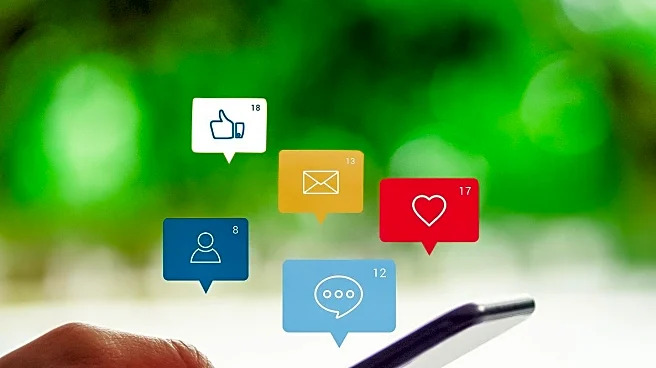What is the story about?
What's Happening?
Recent data highlights a significant shift in reading habits among U.S. adults and teens, with social media usage being a major contributing factor. According to Pew Research Center, social media platforms like Facebook, Instagram, and YouTube have seen a dramatic increase in user engagement since 2005. Currently, nearly 70% of U.S. adults use Facebook, about half are on Instagram, and 80% use YouTube. This rise in social media usage correlates with a decline in daily reading for pleasure, which has decreased by over 40% in the past two decades. The trend is particularly pronounced among teens, with nearly half reporting they are online 'almost constantly.' This shift away from reading is reflected in declining reading scores among students, as reported by the National Assessment of Educational Progress.
Why It's Important?
The decline in reading habits has broader implications for cognitive development and societal engagement. Reading is known to enhance attention, memory, and empathy by requiring sustained focus and imagination. In contrast, social media encourages rapid attention shifts and shallow engagement, which may contribute to a reduced capacity for civil debate and critical thinking. This trend poses a risk to the development of a literate society capable of effective self-governance and advocacy. Additionally, the reliance on social media and digital platforms may lead to increased dependence on artificial intelligence for tasks requiring critical thinking, raising concerns about job displacement and economic stability.
What's Next?
To counteract these trends, there is a need to promote reading as a fundamental skill in homes and schools. Encouraging reading habits from a young age and integrating them into daily routines could help strengthen cognitive skills and foster a more engaged and thoughtful society. Educational institutions and policymakers may need to consider strategies to balance digital engagement with traditional literacy to ensure a well-rounded cognitive development in future generations.
Beyond the Headlines
The cultural shift towards digital media consumption over traditional reading may also have ethical and psychological implications. As society becomes more reliant on quick information and digital interactions, there is a risk of diminishing the depth of personal connections and understanding. This shift could lead to a more fragmented society, where individuals are less equipped to engage in meaningful discourse and empathy-driven interactions.















